It Can Always Get Worse
The U.S. is rich and powerful, but its luck could run out—or worse, get tossed out the window.
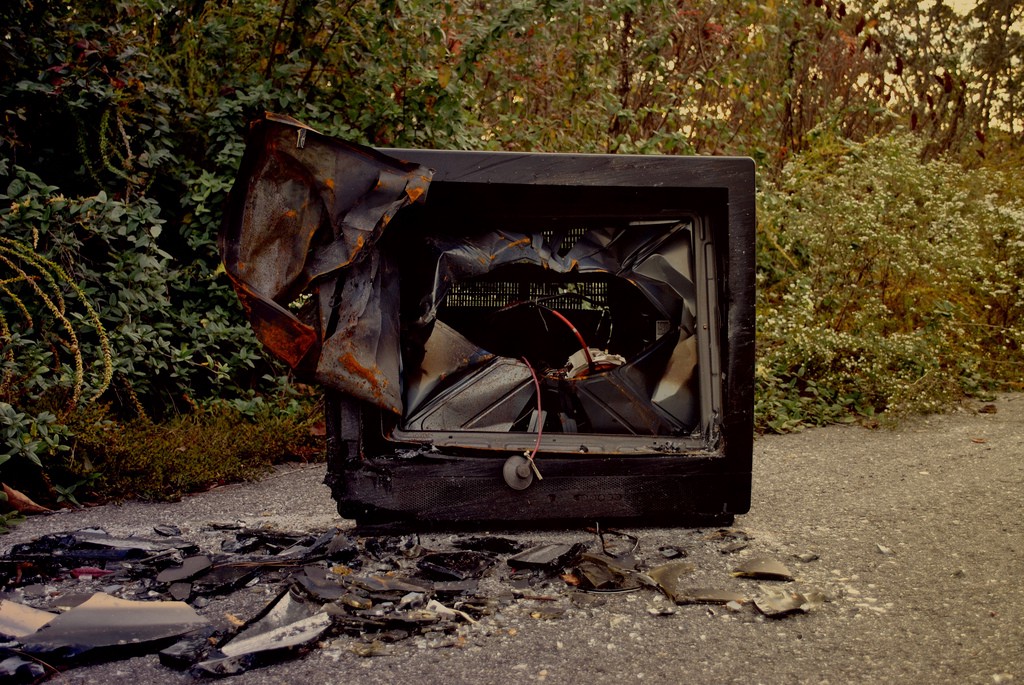
Often when discussing the economy or politics, people will say things like, “Who cares! Throw all the bums out! It can’t get any worse!”
This is, unfortunately, extremely incorrect. It can always get worse. This is especially true in the United States, which is perhaps the luckiest danged country in the history of the world. It is definitely the richest and most powerful danged country to ever exist.
Here’s a screenshot from one of my favorite Wikipedia pages ever, https://en.wikipedia.org/wiki/List_of_countries_by_GDP_(nominal), which measures the total size of every economy in absolute international terms.
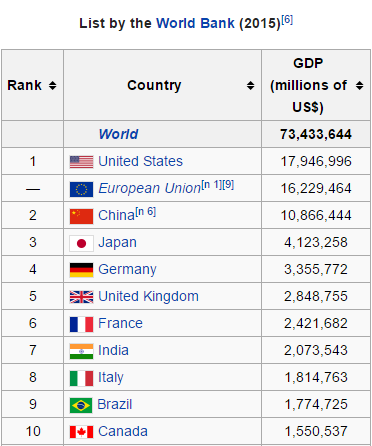
As you can see, we are pretty far ahead of the pack. Second place here, the EU, is actually a big group of countries all added together, and third place has almost 1.4 billion people spreading much less money around. There are 194 countries on that list. Look at these poor guys:
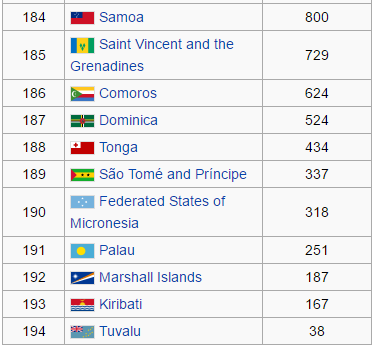
But of course, those places are basically empty. That list is good for getting an idea of geopolitical economic power, but to get an idea of what life is like on average for people in each country, I often turn to my other favorite webpage, https://en.wikipedia.org/wiki/List_of_countries_by_GDP_(PPP)_per_capita, which divides the size of the economy by the number of people and adjusts for how expensive life is there. Again, we’re doing pretty dang good:
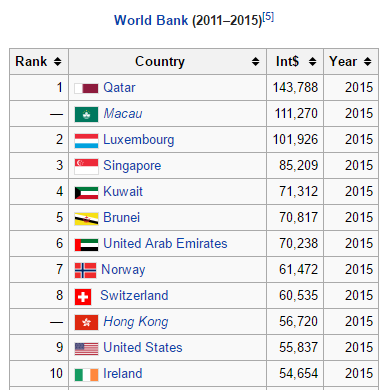
Please note that the countries above us are mostly fake places with no people, maybe just a bank or an oil field with a weird flag sticking out, or Norway. Brooklyn has more people than Qatar; that place doesn’t count. Out of all the countries with significant populations, we’re at the very top of the heap. Then right behind us, in order, we have Saudi Arabia, the Netherlands, Austria, Germany, Bahrain, Denmark, Iceland, Sweden, etc. Other really rich guys.
What is life like in normal countries, or poor countries? Here’s things in the middle:
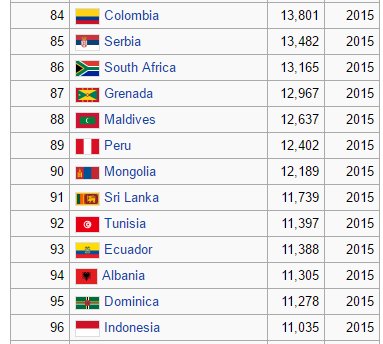
China, by the way, is number 74 with $14,239 annual GDP per capita, adjusted for PPP, so they’re just a tiny bit better off than the median. China, the world’s most populous country, has done quite well in the age of globalization, which means that they have gone from being very, very poor, to just OK. And here’s the bottom:
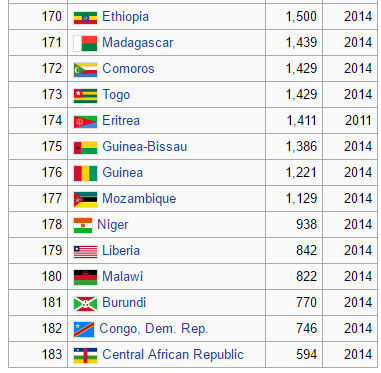
Americans are 5 times as rich as citizens in the world’s median countries! And compared to Earth’s actual corners of poverty, we have 55 times as much.
Let’s try to think which of the following two scenarios is more likely. Are U.S. citizens 5 times as smart, productive, and deserving as the average human being? Or is it perhaps that we have been the major beneficiaries of a deeply unequal, historically contingent, fragile global system that has been carefully constructed over many decades? Maybe things can definitely get worse? From the perspective of any other country on Earth, the notion that our exorbitant American privilege is simply the natural state of affairs — the default settings on the world’s operating system, which we can just reset to Great Again at will — is laughable. It’s not only that we could lose our power and wealth. One could even make a convincing case that we should.
When we fell into a position of unprecedented power after World War Two, thousands of people worked carefully for decades to create trade and diplomatic ties around the world. Maybe setting fire to that entire edifice — which the U.S. built in its own image, often employing violence to do so—might not magically lead to outcomes that are good for us?
We know that life sucks very badly, and on top of the cruel burdens of existence itself, the huge amounts of money that flowed into the U.S. during the globalization of the last three decades was distributed very poorly. Economic elites took almost all the gains for themselves; a credible plan to now spread that wealth around and take advantage domestically of our enormous economic power would be welcome. At home, we do use our national wealth in bizarrely inefficient ways. Healthcare would be nice, for example. I’ve spent the last few years reporting on politics and economics in South America, and it’s been very clear down here recently that just because a society is unequal and dysfunctional, shaking things up does not necessarily lead to improvement.
By any broad historical standards, the era of peace, democracy, prosperity and global dominance that the U.S. enjoyed from 1945–2016 seems like an especially lucky break. It would be one thing if our political leaders presented a concrete plan to improve upon existing globalization, or use its resources to expand public services. It’s entirely another to go to battle with all of our partners and assume that by being “tough and smart” we’ll put it all back together again, even better. Political systems do explode — in fact, most of the systems in history have done just that — and just throwing a bomb into the engine rarely fixes your car, no matter how legitimately upset you are with where your car is going, or how fun it may sound to do.

In 2010, a literal clown popularly known as “Tiririca” ran for Congress in Brazil, riding a wave of anti-political sentiment and propelled by two snappy TV slogans. The first was “What does a Congressman do? I don’t know! Vote for me and I’ll tell you.” The second was “Vote no Tiririca! Pior do que tá não fica!” It rhymes and sounds nice in Portuguese but in English it’s best translated as “Vote for Tiririca! It can’t get any worse!”
This message resonates. He won more votes than any other candidate running for office. He got so many votes, Brazilian electoral rules allowed him to actually bring four other men (in Brazil it’s almost always men) into office to serve as Congressmen along with him. At the time, bien-pensant voters lamented that their country could fall for such an infantile rebellion and asked if it was proof that Brazil was an immature banana republic. Others said maybe he responded, in an insane way, to a real disconnect from the political system.
Brazil was very far from perfect in 2010, but viewed from the perspective of 2016, the promise that things could not get any worse now seems like a cruel joke. In 2010, the economy was growing at 7% per year, unemployment was at historic lows, and Latin America’s largest country elected its first woman president. In 2016, the country is in its worst recession in a century, unemployment is at 12%, and that woman, Dilma Rousseff, was impeached this year by a group of men whose new more conservative government is plagued by accusations of corruption.
I interviewed Tiririca in Congress in 2013, and found him a likable and clever guy. Unlike other clowns elected to major office, he immediately set about proving he was serious about his position, and made sure to attend every legislative session. Ironically, his major role in office has probably just been to lend support to more powerful, traditional factions around him. I remember the gasp that when up in Congress this year when he unexpectedly voted to impeach Rousseff, but even then, he was just switching sides from one powerful faction to another.
Clearly, Tiririca didn’t ruin Brazil himself. But the same broad anti-political sentiment that brought him to power was arguably also behind the explosion of protests in 2013 (clearly inspired by the countries of the Arab Spring, which now serve as some other pretty stark reminders that things can go from very bad to very worse). Those protests were followed by a questionable handover to men proclaiming loudly they will do the exact opposite of what the protesters asked for by cutting basic public services.
So what’s the lesson? It’s if it ain’t broke, don’t fix it? No, not exactly. Maybe just, “Even if it’s broken, try to fix it instead of angrily destroying it.” Perhaps it’s just that successful revolutions require tight coordination and a dedicated game plan. If there is indeed a careful road map prepared to lead us from 2016 politics to some shining American future, we certainly haven’t seen it.
In 2013, incoming White House chief strategist Steve Bannon reportedly told The Daily Beast, “I’m a Leninist…Lenin wanted to destroy the state, and that’s my goal, too. I want to bring everything crashing down, and destroy all of today’s establishment.” If anything, Leninism was about strict organization to seize power and quickly create a new state. But this dude is talking about the final scene from Fight Club. Someone cue the Pixies.
